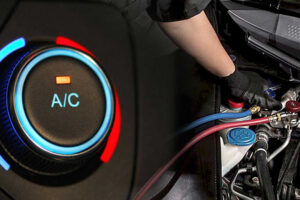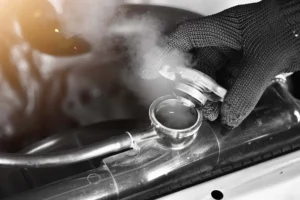Car differential problems and solutions.
The differential is a crucial component of your vehicle, responsible for transferring power from the engine to the wheels while allowing them to rotate at different speeds—especially during turns. If the differential isn’t functioning properly, it can lead to a variety of issues that not only affect your vehicle’s performance but can also pose safety risks. Understanding the signs that indicate your vehicle’s differential needs repair and service attention can help you address problems early, saving you from costly repairs and keeping your vehicle running smoothly.
What is a Differential and How Does It Work in Your Vehicle?
Before diving into the signs of differential issues, it’s essential to understand what a differential does. In simple terms, a differential allows for smooth power transfer from the engine to the wheels. It ensures that the outside wheels turn faster than the inside wheels during a turn, which is crucial for maintaining control and traction.
Differentials can be found in front- and rear-wheel-drive vehicles, as well as all-wheel and four-wheel-drive systems. Different differentials exist, including open, limited-slip, and locking differentials, each serving a specific purpose.
Common Signs That Indicate Your Vehicle’s Differential Needs Attention
Unusual Noises Coming from the Differential While Driving
One of the first signs that your differential may need attention is the presence of unusual noises. These noises can indicate that the differential gears are worn, damaged, or improperly lubricated. Common sounds to watch for include:
- Whining or Humming Sounds: If you hear a persistent whining or humming noise that changes with the speed of the vehicle, this could be a sign of worn gears in the differential. This noise may become more pronounced when you accelerate or decelerate.
- Clunking or Grinding Noises: A clunking or grinding noise when you shift gears or during acceleration can indicate serious issues with the differential. This could be due to damaged gears or a lack of proper lubrication.
- Popping Sounds When Turning: If you hear popping sounds when turning, this might be a sign that the differential is failing or that the axle is damaged.
- bad differential causes transmission problems.
Fluid Leaks Underneath Your Vehicle Indicating Differential Issues
Another critical sign of differential issues is fluid leaks. The differential relies on fluid for lubrication and cooling, and any leaks can lead to severe damage. Here are some points to consider:
- Fluid Location and Appearance: If you notice puddles of fluid under your vehicle, it’s essential to identify the type of fluid. Differential fluid is typically thicker than motor oil and may appear red or brown.
- Regular Checks for Leaks: Regularly inspect the area around the differential for signs of leakage. If you find any leaks, it’s crucial to address them immediately to prevent further damage.
Handling Issues Indicating Possible Differential Problems
If your vehicle’s handling begins to feel off, it could be a sign of differential problems. Here are some handling issues to watch for:
- Pulling to One Side While Driving: If your vehicle pulls to one side while driving straight, this may indicate differential issues or problems with the wheel alignment.
- Vibration When Accelerating: A noticeable vibration in the vehicle, particularly during acceleration, can suggest issues with the differential. This may be due to worn or damaged gears or a malfunctioning axle.
- Difficulty Making Turns: If you experience difficulty making turns, especially tight turns, this could indicate that the differential is not functioning correctly.
Warning Lights Illuminated on Your Dashboard Related to the Differential
Modern vehicles are equipped with warning lights that can alert you to potential issues. If you see a warning light related to the differential or traction control, it’s crucial to address the problem immediately.
- Check Engine Light Activation: This light may not specifically indicate a differential problem, but it can illuminate if the vehicle’s computer detects issues related to traction control or power distribution.
- ABS Light On: If the anti-lock braking system (ABS) light is on, it may indicate that there is a problem with the differential or the vehicle’s ability to distribute power to the wheels.
Increased Tire Wear Patterns Indicating Differential Malfunction
Uneven or excessive tire wear can also indicate differential issues. If your differential is malfunctioning, it can cause the tires to rotate at different speeds, leading to uneven wear patterns.
- Inner or Outer Tire Wear: If you notice that the inner or outer edges of your tires are wearing down faster than the rest, it could be a sign of differential problems.
- Regular Tire Inspections Recommended: It’s important to have your tires inspected regularly. If you notice unusual wear patterns, consult a professional to determine if the differential is the culprit.
Burning Smell Coming from the Differential Area
A burning smell while driving can indicate that your differential fluid is overheating. This can happen if the fluid level is low or if the fluid has become contaminated.
- Checking Fluid Condition: If you notice a burning smell, check the condition of your differential fluid. It should be clean and free of debris. If it appears dark or smells burnt, it’s time for a fluid change.
Difficulty Shifting Gears Indicating Potential Differential Issues
If you experience difficulty shifting gears, especially in vehicles with manual transmissions, it could indicate differential problems. This can occur if the differential does not allow the wheels to rotate at the proper speeds.
- Sticking or Grinding When Shifting: If the transmission sticks or grinds when you shift, it’s crucial to have the differential and transmission inspected.
What to Do If You Notice These Signs of Differential Problems
If you observe any of these signs, it’s essential to take action quickly:
- Consult a Professional Mechanic for Inspection: If you suspect that your differential is having issues, consult a professional mechanic. They can perform a thorough inspection to determine the cause of the problem.
- Regular Differential Maintenance for Optimal Performance: Regular maintenance is key to preventing differential issues. This includes checking the differential fluid level and condition, as well as having regular inspections performed by a qualified technician.
- Address Repairs Promptly to Avoid Further Damage: If repairs are needed, address them as soon as possible. Ignoring differential problems can lead to more severe damage and costly repairs down the line.
Conclusion:
Understanding the signs that your vehicle’s differential needs attention can save you time, money, and stress. By being proactive and recognizing these warning signs early, you can prevent further damage and ensure your vehicle operates smoothly. If you notice any unusual noises, fluid leaks, handling issues, or warning lights, it’s essential to consult a professional mechanic to address the problem promptly. Regular maintenance and inspections are key to keeping your differential in optimal condition, allowing you to enjoy a safer and more efficient driving experience.




